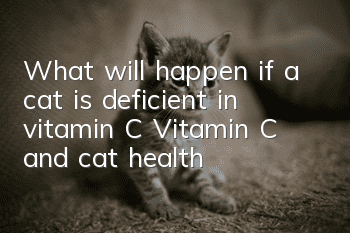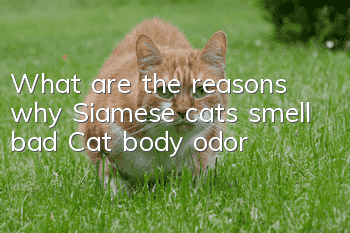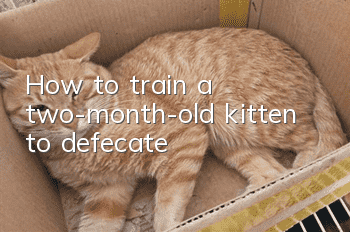What will happen if a cat is deficient in vitamin C? Vitamin C and cat health!

Cats
Vitamin C is the general name for the biologically active compound of ascorbic acid. It is a water-soluble vitamin that is abundant in fruits and vegetables. It is an indispensable vitamin nutrient for cats, which can maintain the normal structure between cells and promote wound healing. It plays a regulatory role in redox metabolic reactions, and its lack can cause scurvy.
Vitamin C is the most effective water-soluble antioxidant in extracellular fluid. It has anti-lipid peroxidation effect both inside and outside cells. It interacts with the defense of intracellular free radical scavengers SOD and GSH-PX. There is a difference. Vitamin C has a stronger antioxidant effect than other plasma components such as bilirubin and α-tocopherol, and has a blocking effect on the ongoing lipid peroxidation reaction in plasma, thereby protecting biological membranes from lipid peroxidation. It is the first line of defense of the extracellular fluid antioxidant defense system.
Vitamin C also plays an antioxidant role in the normal operation of the redox chain in the body, thereby protecting red blood cells and scavenging oxygen free radicals in tissues. Vitamin C also plays an antioxidant role by scavenging free radicals and inhibiting lipid peroxidation in intact liver cells, protecting liver function. In addition, vitamin C, in addition to its direct function of scavenging free radicals, can also assist vitamin E and glutathione in scavenging free radicals.
1. Clinical symptoms of vitamin C deficiency
Initial symptoms include listlessness, decreased appetite, and slow growth and development of young pets. If not treated in time, characteristic hemorrhagic symptoms will occur, such as swelling, pain, and bleeding of the gingival mucosa, which will lead to the formation of ulcers. In severe cases, ulcers or necrosis may also occur on the cheeks and tongue. Gingival necrosis or alveolar atrophy causes teeth to become loose or even fall off, resulting in excessive salivation and bad breath. The joints are swollen, painful, difficult to move, and like to lie down. Subcutaneous petechiae, hair follicle keratosis, gastrointestinal, renal, bladder, nasal mucosal bleeding, etc.
2. Causes of vitamin C deficiency
Puppies cannot synthesize vitamin C within a certain period of time after birth and must obtain it from breast milk. Insufficient or deficient vitamin C content can easily cause disease; in the process of gastrointestinal diseases or liver diseases, vitamin C absorption, utilization, and synthesis disorders occur; pneumonia, chronic infectious diseases, or poisoning diseases cause a large amount of vitamin C in the body to be consumed, causing relative deficiency. It can cause disease; during chronic diseases and stress, the consumption of vitamin C increases relatively, and relative deficiency may occur; in addition, because vitamin C is easily oxidized, vitamin C is seriously oxidized during feed processing, resulting in a lack of vitamin C in the feed, so long-term Feeding feed that is deficient in vitamin C is also one of the causes of deficiency.
3. Prevention and treatment of vitamin C deficiency
Improve feeding and management, provide fresh feed rich in vitamin C, and design and supplement daily vitamin nutrition for pet cats When in need, the actual needs of various vitamins should be comprehensively considered to ensure that pet cats receive sufficient and reasonable nutritional needs.Long-term use of feed with too low or too high vitamin content, especially feed with too low or too high fat-soluble vitamin content, may cause adverse reactions to the growth and development of pets or the maintenance of normal metabolism.
Although some fruits and vegetables are rich in vitamin C, these foods are not very palatable to cats. The way to supplement vitamin C is to add vitamin C tablets to your cat’s food. However, some parents report that cats do not like to eat vegetables. Cats do not like to eat vegetables or do not like to eat certain types of vegetables. This is because cats do not like the special taste of certain vegetables or because vegetables contain more crude fiber and are not easy to chew. Rotten, difficult to swallow, and caused by the cat’s picky eating habits.
- How to solve the problem when a female cat is in heat? Come and take a look!
- How to raise newborn kittens without a mother cat
- What to do if a cat has a urinary infection? How to check for feline urinary system diseases!
- When can you train a cat to achieve the best results? Make the cat well-behaved and clingy!
- The female cat suddenly became irritable and refused to be touched
- The kitten has a big belly
- What are the personality traits of American Shorthair cats? Tips for raising American shorthair cats
- How old is a cat for adoption?
- How long does a Siamese cat live?
- Why does a 7-month-old cat eat very little?



